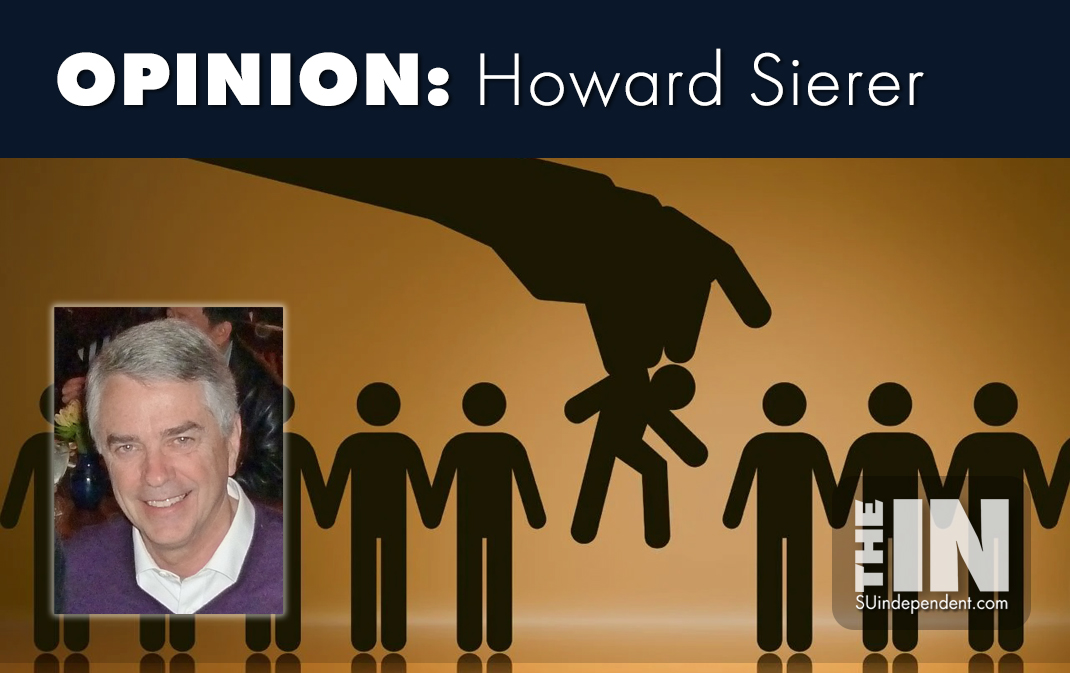
Disagreement Isn’t Discrimination
– Howard Sierer –
Can government require workers who have creative or specialized skills to violate their personal, deeply-held beliefs? If these workers refuse, can they be accused of discrimination?
Before you answer, consider the following hypothetical businesses open to the public at large. Should a two-woman public relations firm be required to publicize a pornography exhibition? How about a Jewish speech writer asked to compose a neo-Nazi harangue? Or a Muslim artist asked to draw a picture of Muhammad?
On the one hand, federal and state laws require businesses that serve the public to do so without discriminating against persons protected by various civil rights statutes. On the other hand, our Constitution’s First Amendment guarantees the free exercise of religion, freedom of speech and freedom of the press.
These rights have collided in recent years as federal, state and local governments have extended civil rights to areas that can conflict with some who have deeply held beliefs.
The Supreme Court weighed in on this issue with last month’s decision in 303 Creative LLC v. Elenis. At issue was a Colorado public accommodation law protecting LGBTQ individuals from discrimination, similar to many across the country. When a gay couple asked 303 Creative’s owner, Lorie Smith, to design a website celebrating their same-sex marriage, she refused, saying doing so would violate her First Amendment rights.
Justice Gorsuch’s decision, supported by five other justices, explained that the First Amendment “protects an individual’s right to speak his mind,” even when others may regard that speech as “deeply misguided” or that it may cause “anguish.” Colorado’s logic, he said, “would allow the government to force all manner of artists, speechwriters, and others whose services involve speech to speak what they do not believe on pain of penalty.”
He continued: “The opportunity to think for ourselves and to express those thoughts freely is among our most cherished liberties and part of what keeps our Republic strong.” While that “means all of us will encounter ideas we consider” wrongheaded or even offensive, “the First Amendment envisions the United States as a rich and complex place where all persons are free to think and speak as they wish, not as the government demands.”
The Court made a comparable watershed decision in 1943’s West Virginia v. Barnette. That case challenged the public school requirement that students salute the flag and recite the Pledge of Allegiance. Even in the midst of World War II, the Court held that public schools were violating Jehovah’s Witnesses’ freedom of speech. The court said “no official … can prescribe what shall be orthodox” or “force citizens to confess by word or act their faith therein.”
Justices who dissented from this year’s 303 Creative decision saw it as a retrenchment of civil rights that cast LGBTQ Americans as second-class citizens. “Around the country, there has been a backlash to the movement for liberty and equality for gender and sexual minorities,” Justice Sonia Sotomayor wrote.
So is 303 owner Lorie Smith a bigot? Colorado agreed with her that she’ll happily design a website for a gay customer who wants to promote, say, an animal rescue cause. What she won’t do is promote causes that violate her conscience.
This echoes Colorado’s Masterpiece Cakeshop owner Jack Phillips who refused to make a wedding cake celebrating a same sex marriage. Neither discriminates against their customers, but both choose the messages they are willing to create.
Kristen Waggoner, the attorney who argued on behalf of 303 Creative before the court, says that “disagreement isn’t discrimination, and the government can’t mislabel speech as discrimination to censor it.” The state “should no more censor Lorie for speaking consistent with her beliefs about marriage than it should punish an LGBT graphic designer for declining to criticize same-sex marriage,”
So with conflicting rights supporting both sides of this argument, is there middle ground?
I fully support public accommodation laws that allow all Americans including LGBTQ citizens full access to jobs, housing, health care and the like. But I am in full agreement with the Court’s decision preventing government from restricting my right to speak freely or to require me to parrot the party line.
Progressives insist that all institutions include proportional numbers of individuals with diverse race, ethnicity and sexual orientation. Will they ever support diversity of thought and speech as well?




It opens the door to a nation of “out” bigots. The Supreme Court is determined to help the GOP divide and conquer us. Shame on them!